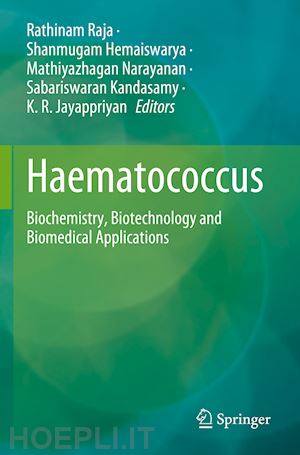
Questo prodotto usufruisce delle SPEDIZIONI GRATIS
selezionando l'opzione Corriere Veloce in fase di ordine.
Pagabile anche con Carta della cultura giovani e del merito, 18App Bonus Cultura e Carta del Docente
This book offers a comprehensive analysis of microalgal cultivation methods and optimization of astaxanthin production for various applications, including clinical uses, algae polymers, proteins and pigments, food applications and packaging, algae forming, cosmetics, and more.
Microalgae are unicellular living forms and are the primary producers that play a major role in the ecosystem. Commercially, while many documents are available, some recent fields are yet to be explored. The book comprises 19 chapters contributed by experts and reviews the recent developments in the cultivation, harvest, and genetic engineering of H. pluvialis-derived astaxanthin. It also discusses their bottlenecks and challenges in commercial-scale production, as well as current and prospective global market. Current research supports the exploration of new topics and practical applications of microalgae and their products, which will also benefit academia.
The book will be an importantresource for researchers and industry, providing comprehensive knowledge on broad topics. Flow charts, updated methods, and colour images are included to help the readers' understanding.
Chapter 1. An Introduction to Haematococcus .- Chapter 2.
Nutritional studies and optimization of biomass from unicellular microalgae Haematococcus sp.-Chapter 3. Abiotic stress factors and high astaxanthin accumulation in Haematococcus pluvialis.- Chapter 4. Haematococcus: Cultivation for Astaxanthin Production.- Chapter 5. Bottlenecks in the cultivation processes of Haematococcus pluvialis.- Chapter 6. Biochemistry of Haematococcus .- Chapter 7. Lipids, lipidomics and biosurfactants of Haematococcus.- Chapter 8. Genetic engineering approaches for Haematococcus: Recent developments in genome sequencing and strain improvement.- Chapter 9. Food and Food Packaging Technology.- Chapter 10
Algae Materials for Bionanopesticides: Nanoparticles and composites.- Chapter 11. Environmental Impacts Related to Upstream and Downstream Processing of Haematococcus pluvialis.- Chapter 12. Therapeutic potential of Haematococcus pluvialis in the field of drug delivery.- Chapter 13. Clinical applications of Haematococcus. - Chapter 14. In silico exploration of therapeutics in Haematococcus pluvialis.- Chapter 15. Algal Polymers, Proteins and Pigments for Industrial Applications.- Chapter 16. Valorising Haematococcus biomass for commercial applications.- Chapter 17. Biotechnological applications of Haematococcus: Future perspectives.-
Chapter 18. Commercialization of Haematococcus-based products: Current status and future forecast.- Chapter 19. Bioenergy Applications of Haematococcus.-
Dr. Rathinam Raja is a Professor at Sree Balaji Medical College and Hospital (SBMCH)-Bharath Institute of Higher Education and Research (BIHER), Chennai, India. He pursued his Ph.D. in microalgae at the University of Madras in 2004. He did his Post-Doctoral Research at IIT Madras (India), followed by a two-year tenure as a Lead Scientist at Aquatic Energy LLC, Louisiana. He has vast work experience at universities in Taiwan, South Korea and Portugal. He has published 33 international articles, two patents, 14 book chapters and is currently editing a couple of books.
Dr. Shanmugam Hemaiswarya received her Ph.D. from the Department of Biotechnology, IIT Madras, India followed by research experience at the University of Algarve, Portugal. She received a three-year Women Scientist (WOS-A) fellowship from the Department of Science and Technology, India and completed the project at AUKBC Research Centre, Anna University, Chennai. She also worked as a Project Officer at the Department of Biotechnology, IIT Madras and currently working as a Project Scientist at University Innovation Cluster, Anna University, Taramani Campus, Chennai. She has published 33 international articles, 12 book chapters and co-authored five books.
Dr. Mathiyazhagan Narayanan is an Assistant Professor at the Department of Biotechnology, Saveetha School of Engineering, SIMATS, Chennai, India. He pursued his Ph.D. in Biotechnology at Periyar University in 2013. He has strong research networks and collaborations with a number of Professors in the biological field from various leading institutions in Asia and Europe. He has published 75 research articles in various national and international peer-reviewed journals, ten book chapters and edited one book.
Dr. Sabariswaran Kandasamy is a Research Professor at the Water-Energy Nexus Laboratory, Department of Environmental Engineering, University ofSeoul, Seoul, Republic of Korea. He pursued his Ph.D. in Environmental Science in 2016 at Madurai Kamaraj University, India. He has worked as a Postdoctoral Fellow at Jiangsu University, China, for three years and as a University Postdoctoral Fellow at Periyar University, India, for a year. Further, he has worked as an Assistant Professor in the Department of Biotechnology at Vysya College, India, for one year. He has published 67 international articles, five book chapters and one patent. He has been working as a reviewer in several peer-reviewed journals and Editor-in-Chief of Chemical Science Review and Letters. He has received the Young Bioenergy Scientist Award, Young Innovator Award, Best Publications Award, and Best Young Scientist Award in Natural Resources and Waste Recycling.
Dr. K.R. Jayappriyan is an Assistant Professor at the Centre for Advanced Studies in Botany, University of Madras, India. He has considerable expertise in algal biotechnology for the past ten years from his Ph.D. curriculum till date. He has vast outdoor practice, especially hands-on experience in isolation, identification, compound extraction and purification and various molecular tools used for algae. Previously he worked as a Project Scientist at the National Institute of Ocean Technology (NIOT,) which has enhanced his field of expertise in microalgal biodiesel research. He has published an ample amount of publications on algae in peer-reviewed journals and has written a few book chapters also. He has been awarded Prof. Kalyanasundaram Memorial Prize for best thesis award for his Doctoral degree. Presently, he is involved in developing the ‘Algae based nanoformulated product’ research for humansupplements.











Il sito utilizza cookie ed altri strumenti di tracciamento che raccolgono informazioni dal dispositivo dell’utente. Oltre ai cookie tecnici ed analitici aggregati, strettamente necessari per il funzionamento di questo sito web, previo consenso dell’utente possono essere installati cookie di profilazione e marketing e cookie dei social media. Cliccando su “Accetto tutti i cookie” saranno attivate tutte le categorie di cookie. Per accettare solo deterninate categorie di cookie, cliccare invece su “Impostazioni cookie”. Chiudendo il banner o continuando a navigare saranno installati solo cookie tecnici. Per maggiori dettagli, consultare la Cookie Policy.